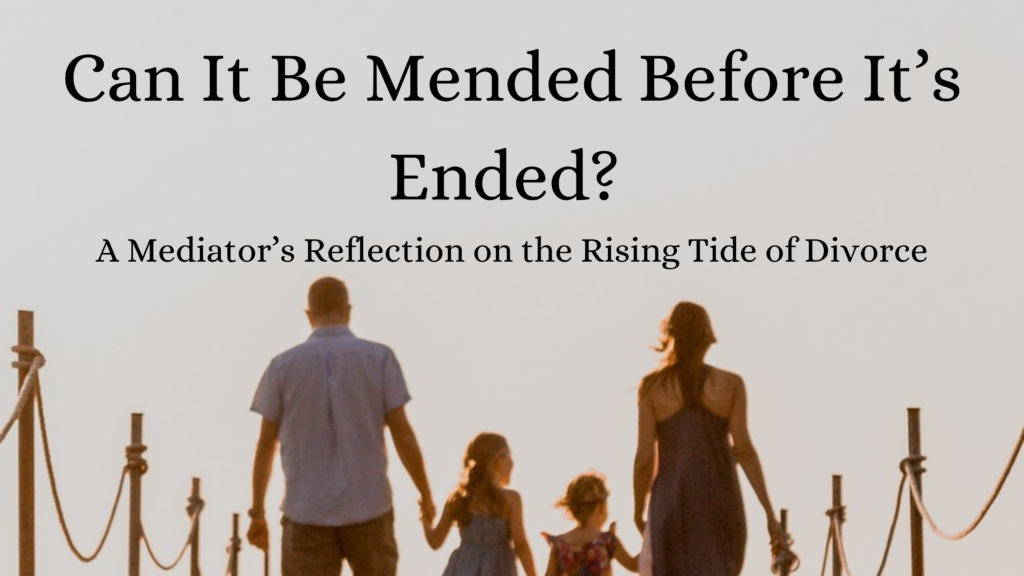Can It Be Mended Before It’s Ended? A Mediator’s Reflection on the Rising Tide of Divorce
When I first heard a High Court Judge ask, “Can it be mended before it’s ended?” concerning the rising number of divorces, the question struck me forcibly. Having been both a divorcee and a family mediator, I have sat on both sides of this complex reality—one where some relationships cannot be salvaged and another where many could have had the proper support, awareness, and skills in place.
My first marriage couldn’t be mended.
We were not a good fit from the beginning—two emotionally immature and entirely damaged young people, bringing unhealed wounds from childhood into a union that was destined to fail. Yet, as a mediator working with separated couples, arranging contact with children, or dividing property and assets, I have seen time and again that many of these divorces did not happen because the marriage was fundamentally unworkable. Instead, they occurred because couples lacked the necessary skills, perspectives, and support to navigate conflict and rekindle connection.
Divorce as the Only Escape?
For many, divorce is less about a considered decision and more about a last resort—a way out of their misery when they can’t see any other viable path. In my years of mediation, I have often witnessed the heartbreaking reality that many couples, had they been equipped with better tools for communication, emotional regulation, and relational awareness, might have found a way through their struggles instead of out of their marriages.
Many of these breakups stem from an inability to handle stress together, resolve disputes constructively, or manage expectations effectively.
And, in more recent times, I have realised something even more crucial: many of these couples were neurodiverse, often without even knowing it. Their struggles in communication, emotional regulation, and daily living were not simply “relationship problems” but manifestations of undiagnosed or unacknowledged neurodivergence—often ADHD or autism—compounded by a lack of professional awareness.
The Invisible Challenge: Neurodiversity in Relationships
Research increasingly shows that ADHD significantly affects interpersonal relationships. Emotional dysregulation, impulsivity, difficulties with object permanence (out of sight, out of mind), and struggles with time management and organisation can create real distress in relationships
Read my blog on ADHD and Interpersonal Relationships next.
If one or both partners in a marriage is neurodivergent and neither is aware of it, conflicts can appear insurmountable.
I now recognise that many of the couples I mediated were grappling with these very issues without any framework to understand them. A neurotypical partner may perceive their ADHD spouse as inattentive, unreliable, or emotionally distant when the ADHD brain operates differently, struggling with working memory, executive functioning, and emotional self-regulation. Without an informed perspective, these challenges are interpreted through the lens of personal failure, neglect, or lack of love—when they are neurological differences that require different strategies, not accusations.
The Cost of Ending Without Mending
The outcome? A fractured family.
Children bouncing between two households.
The stress, legal battles, and emotional exhaustion that come with separation.
And all of this time, energy, and heartbreak could have been better spent working on the relationship.
This is not to suggest that all marriages should be saved—some are genuinely harmful and need to end. However, society is too quick to see divorce as an escape rather than a failure of skills, resources, and relational tools.
What if, instead of defaulting to divorce, couples were given structured support to understand each other truly? What if therapy, coaching, and neurodiverse-informed relationship work were the norm rather than the last, often unconsidered, option?
What Can Be Done?
1. Early Intervention – Couples therapy should not be a last-ditch attempt to salvage a marriage on life support. Preventative relationship education, emotional intelligence training, and conflict resolution skills should be widely accessible.
2. Neurodiverse-Affirming Support – Mental health professionals, mediators, and coaches must become more knowledgeable about neurodivergence in relationships. Understanding ADHD’s impact on communication, memory, and emotional reactivity could prevent countless misunderstandings.
3. Moving Beyond Blame – Shifting from “you don’t care” to “your brain processes things differently” is an enormous but crucial step. If couples can learn to depersonalise their struggles, they can find solutions rather than engage in endless cycles of blame.
4. Rethinking Separation – Instead of seeing divorce as the only way out, more couples could benefit from structured therapeutic separation, conscious uncoupling models, or couples’ intensives before making irreversible decisions.
A Call for Change
The legal system will continue to process divorces at increasing rates, but what if we addressed the root issues instead of simply managing the fallout?
It is not enough to ask, “Can it be mended before it’s ended?” We must actively equip people with the knowledge, skills, and resources to make that mending possible.
For the sake of our families, children, and well-being, we must recognise that many relationships end not because they must but because those within them never had the chance to truly understand how to make them work.
📽️Have you watched my video on ‘Can You Mend It Before You End It?’ – You can find it here.
📚You may also be interested in my book, ‘Can You Mend It Before You End It: Handbook’ with activities and handouts to support you in your journey to discovering whether you can truly mend your relationship.

